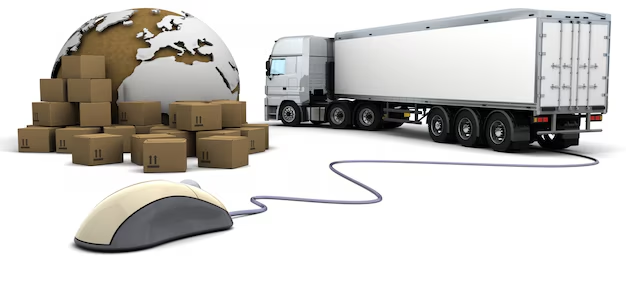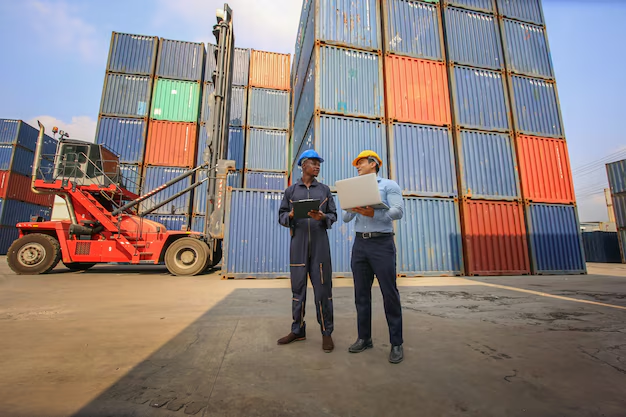
Table of Contents
As per the increasing demands of every individual and the rapid growth of e-commerce, every company is looking for ways to improve their logistic models.
Since road freight logistics is one of the most important in making sure that goods are not only delivered but are delivered on time, more and more applications are trying to edge towards delivery services.
The provision of road freight transport is not about only transporting goods from one point to another to satisfy the client. Instead, it incorporates several tactics to improve overall productivity, lower operational costs, and add value to the customer experience.
The complexity of transportation management, such as route planning, traffic conditions, truck breakdowns and regulatory requirements, is one of the significant problems in road freight logistics. Companies have to find new ways.
They do not have to restrict them but rather find new technological and analytically efficient ways to solve those challenges. Furthermore, engaging with carriers and suppliers translates to better services and bargaining.
Additionally, it is necessary to point out that logistics operations also affect the environment and that there is a need for such an understanding in the modern world.
Cost-saving measures, including fuel diversification and route optimization, such as reducing gas emissions and costs, are good business practices.
When businesses adopt core actions adapted to their peculiarities, they maintain functional road freight logistics systems and sustainable ones over time.
This article addresses these organizations’ knowledge of road freight logistics to provide effective practices and methodologies for road freight logistics.
How can better routing techniques be applied to road freight logistics systems?

Routing techniques must be correctly deployed in the road freight logistics systems so that the applicable service delivery is done efficiently and economically.
Optimal routing techniques require the best strategies, including technology support, real-time data and route planning software.
First of all, GPS tracking and routing applications should be purchased by companies because software of this kind can study the current traffic, the weather and the road repairs to suggest the best optimal routes for delivery.
In addition, they can send orders to their workers when the order is being delivered, which allows a logistics employee to reroute an order if there is an unexpected situation. The second order of improvement is to reduce the authority of people making decisions concerning logistics.
Companies can use records of the deliveries made and evaluate the times of the day that the traffic jam is at its height, why there is a delay and other details that will help in understanding how to route the vehicles next.
Also, drivers should not be excluded from the process, as they often have helpful information about their work area and traffic. Aside from load planning, scheduling takes, which is unfortunately not correctly done.
Companies may put effort into optimizing the load of each vehicle to its limits and organizing delivery routes in such a way as to maximize fuel economy related to the number of trips planned for a stated period.
Last but not least, performance measuring indices are strategies to reschedule trucks and their designated routes at intervals to improve the standards over time.
As a result, it is evident that effective route optimization is not a one-time process; instead, it requires technology, data analytical skills, and working together with all the persons within and touching the logistics chain.
Don’t miss out on reading this blog too. Importance of Road Freight in the Transportation of Goods
In what way can technology enhance the effectiveness of road freight logistics?

The advancement of technology has changed the game where road freight logistics is concerned, as it has offered ways that have improved efficiency, cut costs, and uplifted service quality.
One of the significant areas that stood out due to technology-improved logistics is the application of more efficient tracking solutions to facilitate real-time operations management.
GPS and RFID have enabled constant visibility of threats and precise logistics management since every aspect, including the location of goods and vehicles, can be monitored at a given time.
Such visibility not only aids in effective delivery management but also better provides customers with delivery information by giving them an estimated arrival time.
Similarly, Transportation management systems have also changed the landscape of logistics.
By adopting a TMS, the logistics companies enhance their operational workflow because load planning, route building, and choosing carriers have been eliminated, among other tasks that were done manually.
This reduces the possibility of humanization error, saves working hours, and improves resource utilization. Moreover, TMS includes analytic features that allow evaluation of specific performance metrics, thus helping organizations determine where they can do better and where to improve.
In addition, mobile technology has enabled drivers or other logistics staff with the necessary tools and information.
Mobile applications can also help drivers communicate with dispatchers, allowing changes to be made to the delivery plans quickly when required. Also, ELDs enhance regulatory compliance by recording driving hours and discouraging vehicle overspeeding.
Finally, technology can assist rather than hinder sustainability efforts targeted at road freight logistics.
For example, data analytics can help companies identify variables and operations that cause fuel wastage and emitting that can now be avoided through better routing and load management.
In the end, the role of technology in road freight logistics cannot be overstated as it contributes appreciably to the arousing demand of a very intricate supply chain.
What are the critical factors that influence choosing the freight carrier?

One needs to choose an appropriate freight carrier as its effectiveness and reliability in a road freight logistics chain depend on that decision. Companies should consider several factors as suitable carriers for their business.
First, it is essential to note that a company’s standing and reliability matter a lot more than anything else.
It is recommended that a company checks what other customers say about the carrier regarding their reliability and the carrier’s reputation when delivering so as not to choose an unreliable carrier.
As a result, it implies that customer satisfaction will be compromised if a choice of carrying items is made without a proper understanding of the carrier’s reliability track record.
Second, it would help if you looked into what the carrier can do and their services. Regarding specialization, the parties would also need to review the type of freight the airline focuses on, the geography covered, and the types of trucks owned by the airline.
Some carriers may specialize in one segment of the cargo operation; hence, they will be more effective when making such types of transportation.
Moreover, one should ask about the carrier’s technological and tracking systems capabilities, and even if potential remains unmet, modern technology may increase the visibility during the shipment movement.
Expenses also rank high on the priority list. While it is good to be looking for an affordable cost, it is advisable to avoid going for tenders because one is attracted to the lowest bid.
It is more important to review what the carrier offers, including the service quality, cost, and attendance to specific requirements set within a particular time.
This equilibrium may also help prevent the experiences of other relapses that result in unexplained extra costs like lost time and damage; costly marketing campaigns without potential customers or low-quality service do not bring any results.
Therefore, both communication and customer support should be given a proper focus. A carrier who can talk to the customers and answer their questions can enhance the management of the logistics activities.
Problem-solving can be done effectively with customer service activities—processes without trouble. In conclusion, weighing the essential parameters will make it easier for the business to choose freight companies that fit their logistics strategy and leverage road freight.
FAQ’s
What does freight logistics mean?
This activity includes arranging transportation and storage of goods delivery for timely and systematic accomplishment.
What are the main areas of freight logistics?
These are interrelated logistics disciplines: cloud transportation management, warehousing, inventory management, and even the supply chain management process.
How does technology affect freight logistics?
Advancements in technology also improve freight logistics by helping to enhance the routes, tracking items in real-time and even removing paperwork to improve speed and correctness.
What does the word freight logistics mean?
In simple terms, freight logistics is moving goods from one place to another within a specified time frame and under controlled conditions.
Final thoughts
Implementing the approaches necessary for successfully carrying out road freight logistics operations is very important for companies that wish to succeed in the present-day embattled market environment.
Companies can optimize operational performance and offer high customer service by concentrating on route optimization.

